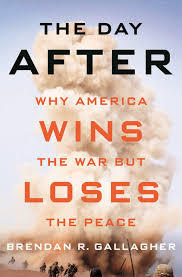Brendan R. Gallagher *17 on the Failure of America’s Postwar Planning

In his new book, The Day After (Cornell University Press), Brendan R. Gallagher *17 asks pointed questions — such as why we haven’t managed to coordinate our post-battle foreign policy — and argues that twin goals of fostering worldwide democracy and bring our troops home create discord. Gallagher warns against unrealistic expectations while analyzing wartime decisions and strategy in Afghanistan, Iraq, and Libya to raise a final question: Will we learn from these mistakes?

Opening Lines: Afghanistan. March 18, 2002. Immediately after the devastating 9/11 attacks, President George W. Bush had decided, “We were going to find out exactly who did this, and kick their ass.” For the moment, it seems we have done exactly that. Operation Anaconda has just ended. The remnants of Al Qaeda and Taliban leadership are currently on the run. U.S. power has reached a new zenith. The Bush administration now has extraordinary domestic and international support that it can use to try to reorient Afghanistan and prevent its future use as a terrorist sanctuary. Under the watchful eye of the world’s superpower, the interim Afghan leadership appears to have a chance to chart a new course. Afghanistan’s future seems bright.
Iraq. May 1, 2003. We have just decimated Iraq’s military with breathtaking speed and efficiency. After Saddam’s statue tumbles down in Firdos Square, President Bush, while aboard the USS Abraham Lincoln, triumphantly announces the end of major combat operations. The prominent “Mission Accomplished” banner behind the president suggests that we did precisely what we came to do. After decades of dictatorship, could we now seize this moment, alter Iraq’s trajectory, and create a beachhead of democracy in the Middle East? To many, particularly those who pushed strongly for the invasion, it seems that we could hardly have asked for a more promising occasion to pursue this vision.
Libya. October 31, 2011. The seven-month-long coalition air campaign comes to a successful end with the potential humanitarian disaster averted and Qaddafi dead. Encouragingly, these milestones were achieved at only a fraction of the cost of other unpopular wars. The Obama administration has seemingly engineered a new model of intervention, and Libya appears likely to be a notable feather in the president’s cap. For now, a widespread sense of optimism is infectious. The wind is at our backs, and there seems to be a singular path to shape Libya’s way forward. Could the Libyan people have a real shot at a more tranquil, prosperous, and perhaps even democratic future?
At each moment highlighted above, the situation seems highly favorable. Our military achieved what it set out to do. We mopped the floor with our enemies. We accomplished virtually all the battlefield objectives. We had a unique moment to build on success and try to foster a new political order. In short, the United States was now in a dominant position to try to impose its will, alongside its wartime partners.
But as we know today, none of these stories ended particularly well.
Reviews: “The Day After is a searing indictment of American strategic incompetence—a tale of a muscle-bound giant repeatedly unable to transform military victory into durable political success. Through painstaking case studies of recent interventions, Brendan R. Gallagher shows that the main cause of the problem is national leaders who simply refuse to confront tough choices or engage in disciplined post-war planning. This book will make you angry—and it should.” — Gideon Rose, author of How Wars End











1 Response
Norman Ravitch *62
6 Years AgoFailures in War and Peace
I have no doubt that Lt. Col. Gallagher's conclusions about our failures in war and peace are valuable and well-founded. However, without having read anything but a short summary of his work, I wonder if the problem is not so much in our military and political leaders as in our entire belief that we have a worldwide mission to make things better than they are. Perhaps these problems have no solution when an American solution is far from adequate. War has never been a solution, but it still is always the solution chosen.